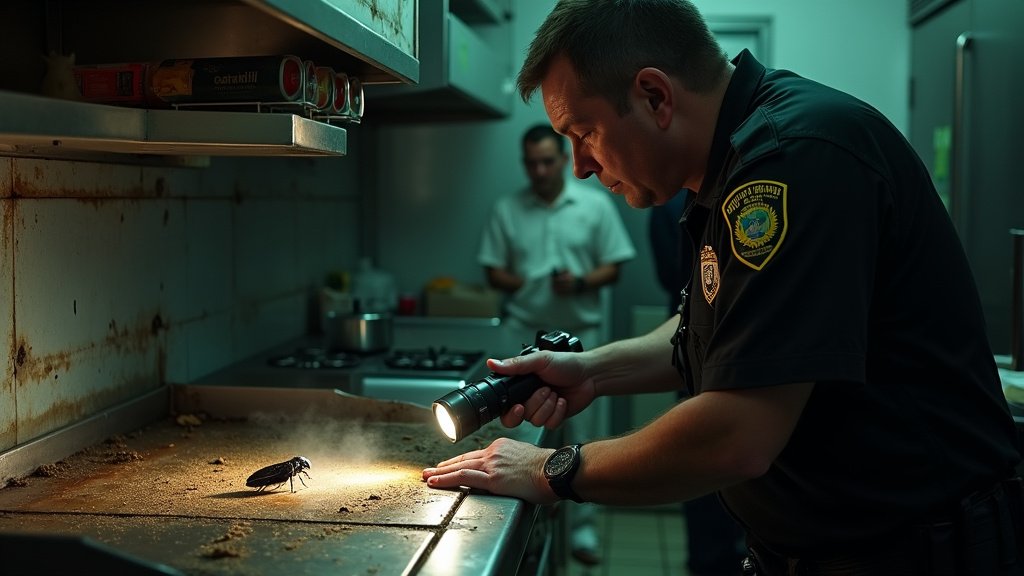A wave of concerning health violations has swept through the South Florida culinary scene, leading to the temporary closure of several well-known establishments, including Christine Lee’s, Checker’s, and Kelly’s Cajun Grill. State inspectors, acting on behalf of the Florida Department of Business and Professional Regulation (DBPR), uncovered a litany of issues ranging from pervasive pest infestations to critical hygiene lapses, casting a spotlight on food safety standards in the region. This trending news story highlights the ongoing vigilance required to maintain public health within the bustling restaurant industry of Miami and its surrounding areas.
Unsanitary Conditions Force Immediate Closures
The alarming findings emerged from inspections conducted on and around August 18, 2025, revealing severe sanitation deficiencies across prominent dining spots. Christine Lee’s, a long-standing institution located at Gulfstream Park in Hallandale Beach, was among the most notable closures. Inspectors documented extensive roach activity, with live roaches discovered on unused flat tops, under fish tanks, and in dishwashing areas. Further compounding the issues, mold was found within the interior of the ice machine, and a critical employee hygiene violation was observed where a worker failed to use soap during handwashing before returning to food preparation. These egregious findings underscore the immediate public health risks identified by authorities.
Further north, Checker’s in Fort Lauderdale faced an emergency shutdown due to significant rodent activity. Inspectors reported approximately 50 rodent droppings on high shelving units near handwashing sinks and dry storage areas, along with a shocking discovery of a cigarette butt on the cook line. Similarly, King’s Super Buffet in Lauderhill was ordered to cease operations after rodent droppings were found on food cans and a live roach was spotted on a kitchen wall, demonstrating systemic issues in pest control and cleanliness.
Kelly’s Cajun Grill at Southland Mall accumulated more than two dozen violations, a staggering number that included rodent droppings, active roach infestations, critical temperature abuse of food items, and generally soiled kitchen conditions. These widespread issues point to a severe lack of adherence to food safety protocols.
Even in the heart of Miami, establishments like Pura Vida Miami on S. Dixie Highway in South Miami were not exempt. Inspectors observed live flies in multiple areas of the premises and noted a critical absence of proof of required employee training, a fundamental component of safe food handling. Another Miami establishment, Barceloneta, had been ordered shut days earlier, on August 14, 2025, also due to significant roach activity.
The Role of State Oversight and Investigative Journalism
These swift actions by the Florida Department of Business and Professional Regulation underscore the critical role of state oversight in safeguarding consumer health. The DBPR conducts both routine inspections and responds to consumer complaints, with emergency closures issued when conditions pose an immediate threat to public safety. The consistent enforcement of these regulations is vital for maintaining standards across the vast landscape of South Florida’s food service industry.
Integral to bringing these issues to public attention is investigative journalism, particularly WPLG Local 10’s long-running “Dirty Dining” segment, led by Jeff Weinsier. This segment frequently highlights the findings of state inspections, providing transparency and accountability. The detailed reporting, often including specific violation counts and graphic descriptions of unsanitary conditions, serves as a powerful deterrent and informs the public about the cleanliness and safety of the restaurants they frequent. The segment ensures this vital news reaches a broad audience.
A Persistent Challenge for the Hospitality Sector
While the recent spate of shutdowns is alarming, it is part of a recurring pattern observed in South Florida. Earlier in August 2025, other prominent eateries, including Burger King and The Original Pancake House, were also temporarily closed due to rodent and roach infestations, along with fly issues and other critical violations. This suggests that maintaining consistent, high-level sanitation and pest control remains a persistent challenge for a segment of the region’s hospitality sector.
Common violations cited repeatedly in inspection reports include pest infestations (roaches and rodents), unsanitary conditions such as accumulation of grease and food debris on surfaces and floors, mold in ice machines, improper food storage temperatures, and lapses in employee hygiene and training. Each of these violations carries significant public health risks, potentially leading to foodborne illnesses and compromising the safety of patrons.
Path to Reopening and Consumer Trust
It is important to note that the immediate shutdown orders are typically temporary. Restaurants are generally permitted to reopen once they have rectified all identified violations and successfully passed a follow-up inspection by the DBPR. This process ensures that corrective actions are taken and that the establishments meet the necessary health and safety standards before resuming service to the public. For many of the recently closed restaurants, including those highlighted in this report, re-inspections have led to their reopening after thorough cleanups.
However, the impact of such closures extends beyond the immediate financial hit to the businesses. They can significantly erode consumer trust, which is paramount in the restaurant industry. Diners often rely on the assumption that establishments operate under strict health guidelines, and revelations of widespread contamination can deter patrons even after a restaurant has been cleared to reopen. The public’s right to safe dining experiences is non-negotiable, and these enforcement actions serve as a stark reminder of the ongoing commitment required from both regulatory bodies and restaurant operators to uphold the highest standards of food safety. This focus on public health remains a critical aspect of Miami area operations and the broader restaurant industry narrative.





